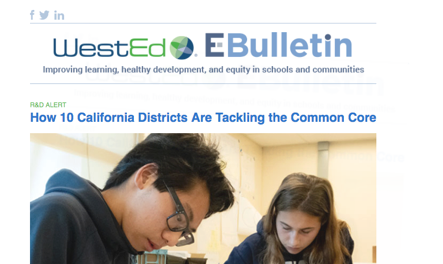Overview
Among the essential tools for teachers to follow and support science learning are classroom-based assessments that can be used formatively to guide instruction and provide feedback to students. Yet, it can be time-consuming for teachers to review student performance on assessment tasks, formulate actionable feedback, and determine instructional next steps. Moreover, it can be challenging to skillfully use information obtained from assessment to move student learning forward. Recent advances in the design of technology-enhanced assessments, including automated scoring and artificial intelligence such as machine learning, can help teachers interpret and use assessment information to improve teaching and advance learning.
Background
The Potential of Automatically Scored Three-Dimensional Assessment (PASTA) project aims to assist middle school science teachers in using technology-enhanced assessment tasks in an instructionally supportive role where assessment is used for improving teaching and advancing three-dimensional (3D) learning. The tasks assess 3D science learning by requiring students to integrate scientific practices, crosscutting concepts, and disciplinary core ideas to make sense of phenomena or solve problems.
The project team—comprised of experts in science education, science assessment, artificial intelligence, learning technologies, and psychology—is developing an automated scoring system within an online platform that will score, organize, and display performance results for teachers and students. As part of the work, the team is also developing and studying automated supports that include feedback for students and instructional guidance for teachers. The project is a multi-institutional effort involving WestEd, Michigan State University, University of Georgia, and the University of Illinois Chicago, and supported with funding from the National Science Foundation.
The project has three primary goals:
- Develop automatically generated student reports (AutoR) for 3D assessments to assist science teachers to notice, attend to, and interpret information in ongoing classroom teaching
- Develop effective pedagogical content knowledge supports (PCKSs) to improve teachers’ use of AutoRs to make effective decisions for instructional moves
- Examine the effectiveness of AutoRs and PCKSs to support teachers’ decision making and student 3D learning.
Intended Impact
There is potential for technology to empower teachers and students to use assessments in new and innovative ways. Advances in automated assessment technologies can help address the challenges related to efficient scoring and interpretation of student responses. Also, timely information provided by classroom-based assessments can enable teachers to provide just-in-time support to students and adjust instruction as needed. Importantly, if designed with the needs of teachers and students in mind, these advances in technology-enhanced assessment can seamlessly connect assessment and instruction for improved learning outcomes.
This project is led by Wested Principal Investigator Christopher Harris and WestEd Co-Principal Investigator David McKinney.


